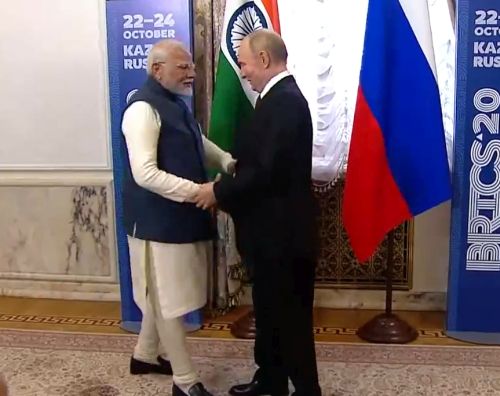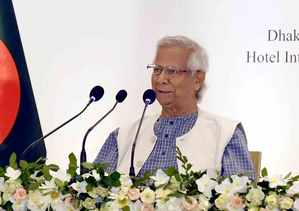International
IANS Analysis: The waning optimism of China-Pakistan Economic Corridor
New Delhi, July 9 (IANS) The China-Pakistan Economic Corridor (CPEC) has become pivotal in China-Pakistan relations in the past decade. Positioned as a focal point of President Xi Jinping’s expansive Belt and Road Initiative (BRI) — a network of transcontinental connectivity projects aimed at establishing an alternative global economic framework to the Western-led order of the United States, the CPEC aims to bolster strategic cooperation between Beijing and Islamabad and open new avenues for economic collaboration between the two nations.
However, nearly a decade later, initial optimism associated with the project seems to be fading, with China expressing dissatisfaction with Pakistan’s current state of affairs, particularly the deteriorating security situation.
Recent months have witnessed repeated targeted attacks on Chinese nationals and interests on Pakistani soil, prompting Beijing to gradually reassess its relationship with Islamabad, despite both nations characterising themselves as ‘ironclad friends’ and ‘All-Weather Strategic Cooperative Partners’. Consequently, China has reportedly downgraded its stance towards Pakistan from “highest priority” to “priority”, reflecting Beijing’s frustration with both Pakistan’s military leadership and the civilian government.
Interestingly, President Xi Jinping has not categorically dismissed the possibility of enhancing and advancing Beijing’s economic cooperation with Islamabad. However, he emphasised that China’s commitment to Pakistan depends on the Shehbaz Sharif government’s ability to implement tangible measures to establish a “secure, stable, and predictable” security environment in the country.
Although both nations have in principle agreed to commence the second phase of CPEC, Beijing has refrained from making any substantial new commitments to Islamabad, despite expressing intentions to align the project with Pakistan’s developmental priorities. A joint statement issued on June 8 indicates that, besides making minor adjustments to ongoing projects like the Karakoram Highway project, the Chinese government did not announce any fresh initiatives under the CPEC.
Regarding the $6 billion Main Line-1 (ML-1) railway project, while the Pakistani government anticipated signing a framework agreement for its execution, China only agreed to proceed with it in a phased manner. This cautious stance is notable, particularly in light of concerns raised by Sinosure, the Chinese state-owned insurance firm overseeing CPEC insurance, regarding Pakistan’s financial instability exacerbated by mounting circular debt.
The joint statement underscores that Beijing has committed to “encouraging Chinese companies to invest in Pakistan’s Special Economic Zones based on market and commercial principles”. However, this commitment is contingent upon Islamabad’s efforts to enhance its business environment and policy framework to better facilitate Chinese investment. This approach suggests China’s emphasis on business-oriented investments in Pakistan, prioritising sectors with potential for commercial returns in the second phase of CPEC.
Specifically, Beijing has strategically prioritised sectors such as IT, agriculture, science and technology, and industry, which also invite third-party investments. The sole sector where Beijing has made an exclusive commitment is the mining of natural resources, aiming to safeguard its commercial interests and maintain a monopoly for assured economic benefits.
Tensions in China-Pakistan relations have been simmering due to Pakistan’s struggle to curb the increasing wave of extremism and terrorism in the country, notably rising incidents of attacks on various Chinese-operated CPEC projects in the past few years. For instance, in March 2024 alone, Pakistan witnessed a series of attacks on CPEC projects in Balochistan and Khyber-Pakhtunkhwa provinces, leading to the deaths of five Chinese nationals.
On March 20, Baloch rebels launched an assault on the heavily fortified Gwadar Port Authority complex, which houses several key offices, resulting in significant structural damage. Notably, Gwadar port represents the flagship project of the CPEC, and an attack on this highly secured complex sends a clear message that no Chinese project, however fortified, is immune to risk in the country.
Subsequently, on March 25, Baloch rebels carried out another attack, this time on the Pakistan Naval Station (PNS) in Turbat. The rebel group claimed that the attack epitomised protest against the growing Chinese presence in the province and the joint Pakistan-China exploitation of Balochistan’s resources.
For Beijing, the inability of Pakistani security forces to protect such prominent and sensitive locations, despite its stringent security measures, raises significant doubts about Islamabad’s capability to safeguard China’s interests effectively.
China’s patience wore thin with Pakistan’s failure to prevent attacks on its interests, highlighted by a suicide bombing by terrorist group Tehreek-e-Taliban Pakistan (TTP) on March 26. The attack targeted a convoy of Chinese engineers on the Karakoram Highway in Bisham, resulting in the deaths of five engineers and their local driver. These engineers were working on a Chinese-funded Dasu hydropower project in Bisham, located in Shangla district of Khyber-Pakhtunkhwa province.
These escalating incidents prompted Beijing to publicly criticise the Pakistani government for its failure to ensure the security of Chinese nationals and projects. The Chinese Embassy in Pakistan urged the Pakistani government to “thoroughly investigate the attack and punish the perpetrators severely”.
Similarly, a statement from China’s Ministry of Foreign Affairs on March 27 called on Islamabad to promptly investigate the incident and “capture the perpetrators and bring them to justice”. This pressure compelled the Pakistani government to promptly dismiss several officials, marking a significant first, due to their negligence in securing the convoy of Chinese engineers.
It should be noted that Beijing made Shehbaz Sharif’s visit to China conditional on Pakistan committing to launch a large-scale counter-terrorism operation akin to Zarb-e-Azb in 2014 and Raddul Fasaad in 2017. According to a local news report, Chinese government officials explicitly urged Islamabad to take decisive military action to “eliminate” all terrorist groups once and for all, citing concerns over the growing threats to Chinese nationals involved in CPEC-related and other ventures in Pakistan.
Chinese government officials have consistently advocated for a comprehensive military operation against extremist groups. During his visit to Islamabad on June 21, Liu Jianchao, Minister of the International Liaison Department of the Communist Party of China (CPC), emphasised that “Pakistan’s internal security shortcomings pose a significant challenge that undermines investor confidence”, stating that “security threats are the primary risks to CPEC cooperation”.
Under pressure and influenced by Chinese demands for enhanced economic cooperation, the Pakistani government announced a large-scale military operation, named Operation Azm-i-Istehkam, on June 22, just a day after public statements by Liu Jianchao. A statement from Pakistan’s Prime Minister’s Office described this as a “revitalised and intensified national counter-terrorism campaign”, aimed at “coordinating and integrating multiple efforts to decisively combat extremism and terrorism comprehensively”.
The changing relationship dynamics between China and Pakistan underscore increasing Chinese distrust towards Pakistan, stemming from Pakistan’s persistent instability and deteriorating security scenario. While Beijing may have compelled Islamabad to declare a substantial military campaign against terrorism, prospects for improving the security scenario in Pakistan appear uncertain, given the outcomes of previous similar operations conducted by the Pak Military. Without creating a favourable security environment and addressing Beijing’s apprehensions, substantial advancement in the CPEC is likely to remain unattainable.
–IANS
scor/sha
International
Lee Hsien Yang seeks refuge in United Kingdom

Lee Hsien Yang, the youngest son of Singapore’s founding father, the late Lee Kuan Yew, announced on Tuesday that he is now a political refugee in the United Kingdom after seeking asylum from the British government “as a last resort.”
“I remain a Singapore citizen and hope that someday it will be safe to return home,” Lee stated in a Facebook post, as reported by Channel News Asia (CNA).
Citing what he described as the Singapore government’s “attacks” against him, Lee, who is the younger brother of former Prime Minister Lee Hsien Loong, revealed that he sought asylum protection in 2022.
Lee Hsien Yang and his late sister, Lee Wei Ling, who passed away earlier this month, have been in conflict with their brother Lee Hsien Loong over the fate of their father’s home following his death in 2015, resulting in a public dispute that has estranged the siblings.
In an interview with the UK-based newspaper The Guardian, Lee alleged that a “campaign of persecution” compelled him to seek asylum in Britain.
In response to his claims, the Singapore government stated that there is “no basis” for his allegations of “a campaign of persecution” or other assertions regarding political repression in the country.
“Singapore’s judiciary is impartial and makes decisions independently. This is why Singaporeans have a high level of trust in the judiciary,” a government spokesperson remarked.
The spokesperson added that there are no legal restrictions preventing Lee and his wife, lawyer Lee Suet Fern, from returning to Singapore. “They are and have always been free to return to Singapore,” the spokesperson said.
Lee and his wife have been outside of Singapore since 2022, having opted not to attend a scheduled police interview regarding potential offenses related to providing false evidence in judicial proceedings concerning their father’s will and the family home.
Lee and his late sister, who had been living at the property, alleged they felt threatened while trying to fulfill their father’s wish to demolish the house. They also accused their elder brother, former Prime Minister Lee Hsien Loong, of abusing his governmental influence to advance his personal agenda.
International
Indo-Russian ties are stronger than ever before at BRICS

Kazan, Russia: Prime Minister Narendra Modi held a bilateral meeting with Russian President Vladimir Putin on the sidelines of the 16th BRICS Summit.
During the meeting, President Putin remarked, “I recall our meeting in July, where we had productive discussions on various issues. We’ve also spoken over the phone several times. I am very grateful you accepted the invitation to come to Kazan. Today, we will attend the BRICS Summit’s opening ceremony, followed by dinner.”
PM Modi responded by expressing his appreciation, saying, “I sincerely thank you for your friendship, warm welcome, and hospitality. It’s a great pleasure to visit such a beautiful city as Kazan for the BRICS Summit. India shares deep historical ties with this city, and the opening of our new embassy here will further strengthen these connections.”
International
Laos seeks to enhance nutrition amid climate change concerns

Vientiane (Laos), Aug 22 (IANS) Representatives from the Lao government and development partners have attended a conference here titled “Climate Change and Nutrition in Laos: Intersections and Interventions” to discuss the impact of climate change on nutrition in the Southeast Asia country and potential solutions.
Speaking at the conference, deputy director general of the Department of Hygiene and Health Promotion under the Lao Ministry of Health Viengkhan Phixay, said, “We gather to address a critical and interwoven issue: the impact of climate change on nutrition and how we can work together to tackle these challenges,” Xinhua news agency reported.
The Lao government is actively engaged in this endeavor, with numerous policies and initiatives aimed at addressing both climate change and nutrition, Lao National Television reported on Thursday.
“By leveraging the Scaling Up Nutrition network in Laos, which is led by the government, and supported by civil society, donors, and the United Nations, we have a robust platform to tackle the negative impacts of climate change while improving nutrition and overall health for everyone in Laos,” Viengkham said at the conference held on Monday.
The conference featured a series of presentations that not only detailed evidence-based research but also introduced innovative tools for measuring and enhancing nutrition under the impact of climate change.
The conference stressed the critical need for integrated approaches to tackle the intertwined challenges of climate change and nutrition, and setting the stage for impactful future collaborations.
–IANS
int/psd
International
One killed, seven injured in shootout in Iraq

Baghdad, Aug 22 (IANS) A civilian was killed while seven others were injured on Thursday in a tribal shootout in Iraq’s holy Shiite province of Najaf, according to a local security source.
The shootout erupted in the early hours between armed men from the local tribe in the al-Zarga area in northern Najaf, some 160 km south of Baghdad, a local police officer told Xinhua on condition of anonymity.
The clash resulted in the killing of an Iraqi civilian and the injury of seven others, including three Iranian Shiite pilgrims, the source added.
A joint force from the Interior Ministry’s emergency response division and Najaf provincial police arrested 53 gunmen from both sides of the shootout and seized weapons and ammunition, the Interior Ministry said in a statement.
It added that search operations are ongoing to locate additional gunmen and weapons, with more details to be released later.
The incident took place as numerous pilgrims traveled to the city of Karbala to observe Arbaeen, which marks the end of a 40-day mourning period for the killing of Imam Hussein, the grandson of Prophet Muhammad, in the Battle of Karbala in 680 A.D.
Typically, these pilgrims also visit Najaf as part of their journey to Karbala.
–IANS
int/jk/arm
International
Bangladesh seeks $1 billion budget support from World Bank

Dhaka, Aug 22 (IANS) Bangladesh’s interim government has sought $1 billion from the World Bank as budgetary support.
The call came from the country’s Power, Energy and Mineral Resources Adviser Muhammad Fouzul Kabir Khan’s meeting with Abdoulaye Seck, the World Bank’s Country Director for Bangladesh and Bhutan, in Dhaka on Wednesday.
He made the plea as the ministry owes more than 2 billion dollars to suppliers in import costs of power and energy, Xinhua news agency reported.
Khan mentioned that the interim government, which was formed with many pressing mandates, is due to settle a $2 billion debt left by the previous government in the power sector.
He said they have already suspended activities under the much-criticized Quick Enhancement of Electricity and Energy Supply Act 2010 and abolished the government’s power to set energy prices without any public hearing.
On August 5, the former Prime Minister of Bangladesh, Sheikh Hasina, was ousted from her country and power, ending her rule since January 2009.
This event was seen as a massive escalation, with what initially started as student’s protests and resulted in a major crisis in Bangladesh.
Earlier on August 8, Nobel laureate Muhammad Yunus took oath as the head of Bangladesh’s interim government.
–IANS
int/jk/as
-
Video2 years ago
PM Modi Attacks Congress in Karnataka with “Kerala Story”
-
Politics2 years ago
Siddaramaiah & DK Shivakumar sworn in as Chief Minister & Deputy CM respectively
-
Cricket2 years ago
CSK players rejoice 5th IPL title with their families (Pics)
-
Entertainment2 years ago
Karan Deol weds his longtime Girlfriend Drisha Acharya (Pics)
-
Sports7 years ago
History Of Official FIFA WORLD CUP Match balls
-
India2 years ago
Ashwini Vaishnaw: Railway Board recommends CBI probe in the Odisha railway disaster
-
Entertainment2 years ago
Urvashi Rautela dazzles on Cannes 2023 red carpet (Pics)
-
Entertainment2 years ago
Sunny Leone gets ready for Kennedy premiere in Cannes (Pics)






























